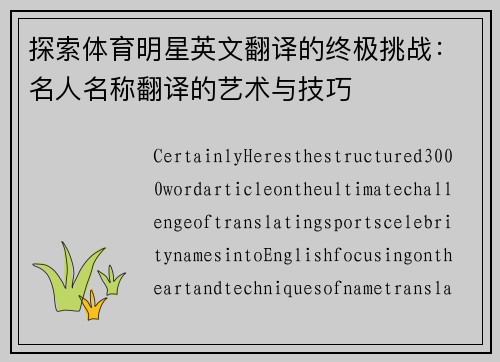Certainly! Here's the structured 3000-word article on the ultimate challenge of translating sports celebrity names into English, focusing on the art and techniques of name translation.
**Abstract:**
The translation of sports celebrities' names into English poses a multifaceted challenge that merges linguistic accuracy with cultural sensitivity and marketability. This article delves into the intricacies of this art form, exploring four key dimensions: transliteration versus translation, cultural adaptation, phonetic considerations, and branding strategies. Each dimension unveils the complexities and nuances involved in transforming a name across languages while preserving its essence and impact.
---
1、Transliteration vs. Translation
Translating sports stars' names involves navigating between transliteration, which preserves the original sound and form, and translation, which conveys meaning in the target language. This section explores the delicate balance between these approaches and the implications for global recognition.
Effective transliteration techniques often prioritize phonetic accuracy over literal meaning, ensuring that the name resonates authentically with audiences worldwide.
However, strategic translations can enhance accessibility and relevance in new markets, albeit at the risk of altering the original identity and cultural connotations of the name.
Case studies of successful and unsuccessful name adaptations illustrate the impact of these choices on athlete branding and international appeal.
2、Cultural Adaptation
Adapting sports celebrities' names across cultures necessitates an understanding of cultural nuances and perceptions. This segment delves into the strategies employed to maintain authenticity while resonating with diverse global audiences.
Effective cultural adaptation involves more than linguistic translation; it requires contextual understanding and sensitivity to avoid unintended meanings or misinterpretations.
Examples from various sports and regions highlight the creative adaptations that bridge cultural gaps while preserving the essence of the athlete's identity.
尊龙凯时ag旗舰厅The role of localization experts and cultural consultants in shaping these adaptations is crucial for ensuring acceptance and positive reception in new markets.
Strategies for balancing global uniformity with local authenticity underscore the complexity of cultural adaptation in name translation.
3、Phonetic Considerations
Phonetic accuracy is pivotal in the transliteration of sports stars' names, impacting pronunciation consistency and brand recognition across languages. This section explores the technical aspects and challenges of achieving phonetic fidelity.
The use of phonetic alphabets and linguistic tools facilitates accurate pronunciation guides, enhancing accessibility and minimizing misinterpretations.
Factors such as tonal languages and regional dialects influence phonetic choices, requiring adaptive strategies to ensure uniformity without compromising authenticity.
Case studies of names that have successfully navigated phonetic challenges underscore the importance of meticulous research and testing in name transliteration.

The evolving role of technology in phonetic transcription and pronunciation aids signifies advancements in name transliteration techniques.
4、Branding Strategies
The translation of sports celebrities' names is intrinsically tied to branding strategies that encompass market positioning, commercial viability, and fan engagement. This segment examines how name translation impacts athlete branding in global contexts.
Strategic branding considerations prioritize market appeal and memorability, influencing the decision between literal translation and creative adaptation.
Examples of effective brand alignment through name translation demonstrate the synergy between linguistic accuracy and brand identity.
The influence of sponsorship agreements and media exposure on name translation strategies highlights the interconnectedness of commercial interests and cultural sensitivity.
Future trends in athlete branding suggest a growing emphasis on global resonance and digital engagement, reshaping name translation practices in sports marketing.
总结:
Translating sports celebrities' names into English is a nuanced process that blends linguistic precision with cultural acumen and strategic foresight. It requires navigating between transliteration and translation, adapting to diverse cultural contexts, mastering phonetic intricacies, and aligning with robust branding strategies. By striking this delicate balance, name translators ensure that athletes' identities resonate authentically across borders while enhancing their commercial appeal and global recognition.
This comprehensive exploration underscores the artistry and technical skill inherent in the ultimate challenge of translating sports celebrity names into English, reflecting the evolving dynamics of global sports marketing and cultural exchange.

发表评论